Page\Park, Denizen Works and Flanagan Lawrence among award winners
Page\Park’s Campus Central project for the University of Stirling, a quirky house by Denizen Works that is partly clad in old TV screens, and Flanagan Lawrence’s new Laidlaw Music Centre for the University of St Andrews are among seven winners of the 2023 RIAS Awards.
The Royal Incorporation of Architects in Scotland’s roll of honour also includes houses by Ann Nisbet Studio and Dualchas Architects, a museum with accommodation by Cameron Webster Architects with Ian Parsons, and Nicoll Russell Studios’ new headquarters at the home of Scottish golf.
Winning projects were picked by a jury made up of Moxon Architects founding director Ben Addy, Bennetts Associates co-founder Denise Bennetts, IF_DO co-founding director Sarah Castle, and Elly McCrone, who is heritage director at Historic Environment Scotland.
Awards jury chair Castle said the seven award winners were beautifully conceived, carefully detailed, sustainable, and innovative.
“They demonstrate the way in which Scottish architects are responding to the challenges of our time, from the climate crisis to loneliness and social isolation,” she said.
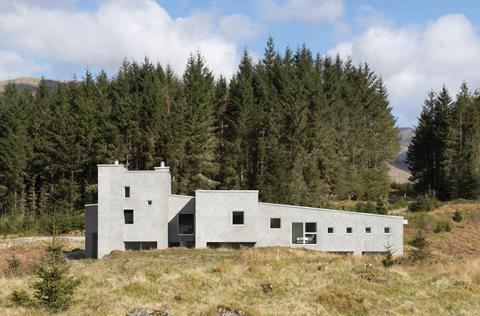
“At their best, these are projects which couldn’t be anywhere else in the world. They draw on the rich history of Scottish architecture, and playfully respond to their context – to the historic cities and diverse landscapes of dramatic mountains, glens, and forests. They contain the essence of what makes architecture in Scotland so special.”
RIAS chief executive Tamsie Thomson said the 2023 awards winners demonstrated architecture’s “power to delight and inspire”.
“Great architecture happens when architects and clients can come together with a clear focus on collaboration and quality,” she said.
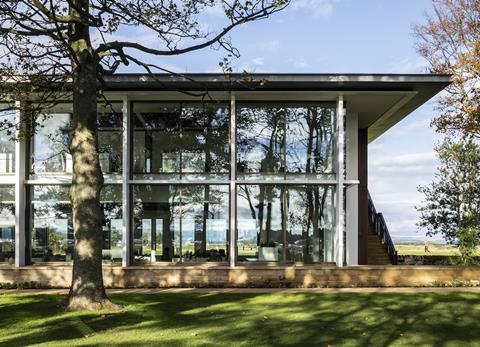
“This year’s winners show that regardless of setting, scale and budget, it is careful procurement and partnership that creates buildings that are truly special.”
The seven RIAS Awards winners will go on to form the longlist for the RIAS Andrew Doolan Best Building in Scotland Award. Recipients of the 2023 RIAS Awards are also eligible for RIBA National Awards, from which the shortlist for the Stirling Prize is drawn.
RIAS Awards 2023 and judges’ citations
Campus Central, University of Stirling, by Page\Park
This landmark redevelopment project at the heart of the University of Stirling’s campus combines the refurbishment and extension of an existing 1970s building to create an exceptional student experience, including new study and learning spaces alongside enhanced student support facilities. Through adaptive re-use, the project establishes a welcoming and vibrant face for students and staff at the University, and for members of the pubic visiting the Macrobert Arts Centre. The university’s parkland campus contains many architecturally important buildings: Page\Park’s Campus Central is recognised as a worthy new addition.
Cuddymoss, North Ayrshire, by Ann Nisbet Studio
This new house is located within and around a ruined building in the Ayrshire landscape – formed over 200 years to house people and cattle. Ann Nisbet Studio conceived the project as a “building within a ruin” – taking a quiet, honest and restrained approach that brings the building gently back to life as a home while retaining the character of the ruin. In the wrong hands, the ruin could have been over-domesticated or romanticised: instead it retains its character and relationship to the landscape, thanks to a light-touch and respectful approach, as well as a careful use of materials. A simple timber-clad second building, connected to the ruin by a glazed link, provides additional space.
Half of Eleven, Isle of Skye, by Dualchas Architects
Half of Eleven was designed by Dualchas Architects as a self-build house, which the owners have built themselves on a modest budget as they work to regenerate their long-held but neglected croft in the coastal township of Breakish. The new house appears as a simple and unobtrusive addition to the landscape, with large windows in the main living space providing beautiful views, and timber cladding used to allow the building to blend naturally with its surroundings. The extensive use of timber continues inside, bringing texture and warmth to the home’s bright and airy spaces. This project demonstrates that architecture does not need large footprints and budgets to create rural buildings of great character.
Hundred Acre Wood, Argyll and Bute, by Denizen Works
Denizen Works’ clients set out to create a home for themselves and their large family: a place that would reflect their personalities, provide a lasting legacy for the family, and do justice to its setting within a stunning landscape overlooking Loch Awe. The design draws upon Scotland’s architectural heritage as well as the sculpture of Eduardo Chillida which, like the house, evokes a sense of carved solid mass which is well-suited to the exposed site and harsh weather. Quirky touches include cladding created with recycled TV screens to create a contemporary take on traditional Scottish harling, and a bathroom with two copper baths side by side, looking out upon the rocky landscape.
Laidlaw Music Centre, University of St Andrews, by Flanagan Lawrence
The first building dedicated to music in the University of St Andrews’ 600-year history creates new opportunities for young people – including students as well as those from the local community – to connect with the performing arts. The new building contains an intimate performing venue, flexible rehearsal space, and a high-tech recording facility, and creates a new quadrangle as an extension of the historic St Mary’s Quadrangle – the oldest part of the university dating to the 16th century. Within its pale sandstone walls, the oak lined recital room contains exceptional technology that allows it to be physically reconfigured and acoustically “tuned” at the touch of a button in order to suit anything from orchestral rehearsals to small-scale ensembles.
Papple Steading, East Lothian, by Cameron Webster Architects with Ian Parsons Architect
Papple Steading, originally built in the 19th century to house cattle, store grain and machinery, and provide farm workshops, is one of the largest steadings in East Lothian. It had lain underused and derelict for years, until client George Mackintosh set about creating a museum to celebrate an agricultural way of life that is fast disappearing. The first completed phase sees the restoration and conversion of the original farmhouse and outbuildings into self-catering accommodation, in order to create income to support the museum’s creation. The extensive conservation project has carefully retained, repaired and upgraded the historic range of buildings, preserving the character of the steading and making best use of its historic fabric to secure its long-term future.
Pilmour House, St Andrews, by Nicoll Russell Studios
St Andrews Links Trust operates the seven public golf courses that constitute the “Home of Golf”: revered by the worldwide golfing community and cherished by local residents as a place for outdoor recreation and relaxation. The new HQ is grounded within its landscape, using highly tailored architecture to encapsulate the trust’s values of quality, heritage and commitment to excellence. Sandstone masonry – a common material across St Andrews – is juxtaposed with lighter framed construction in timber, glass, zinc and aluminium in a pavilion-style building that presents a new public presence for the Trust and commands exceptional views over the surrounding golf courses. Nicoll Russell Studios harnessed this setting to create an office building that draws upon, and augments, a very distinct sense of place.


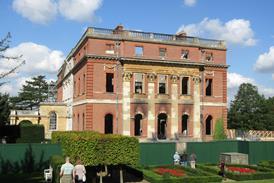
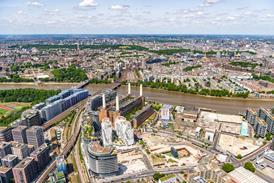





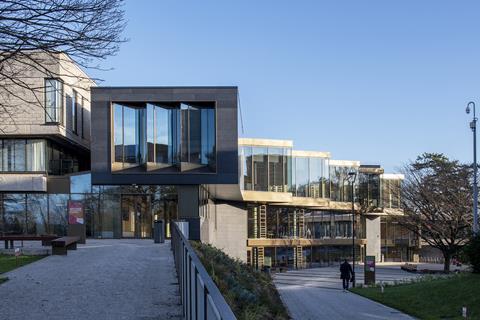
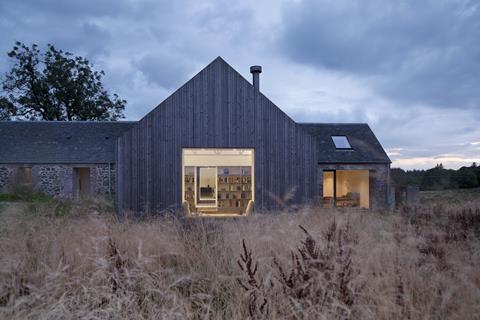
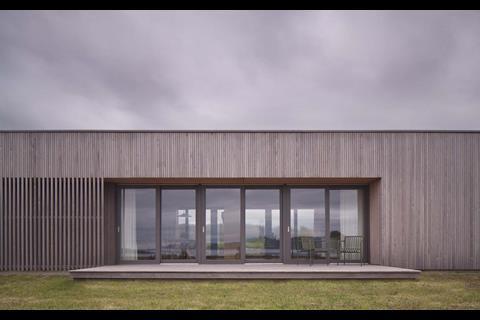

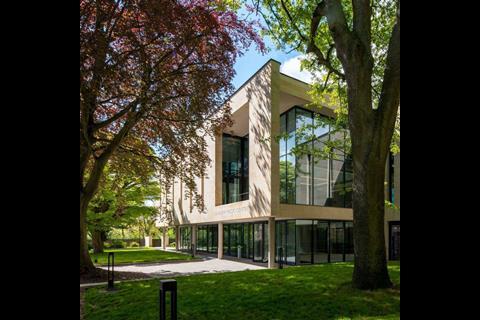
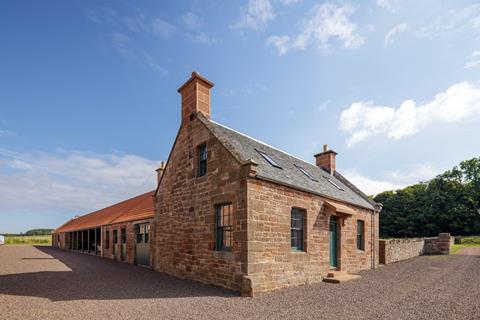








No comments yet